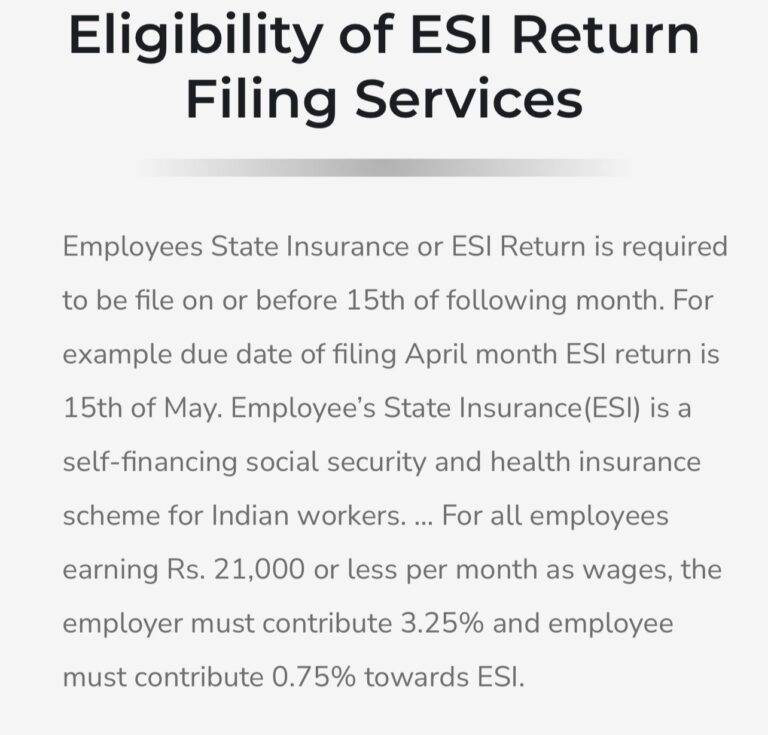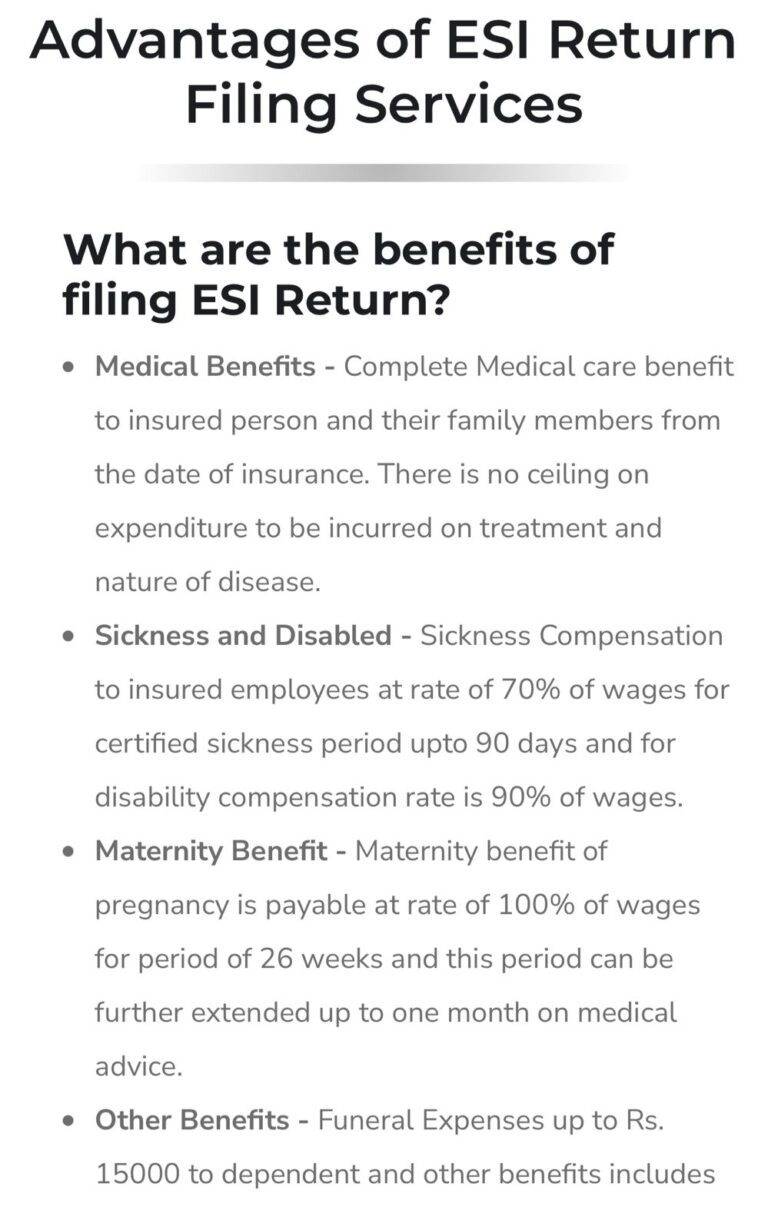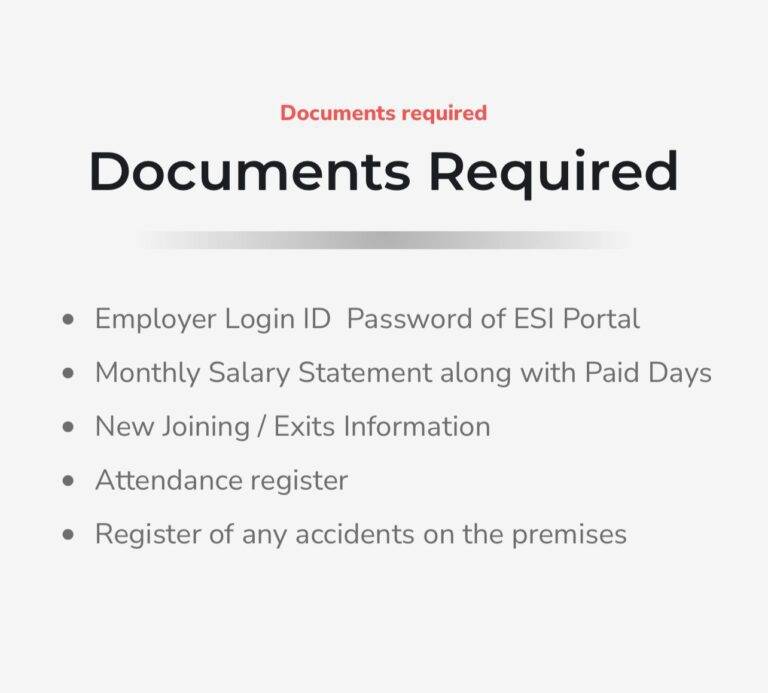ESIC return filing services in Ahmedabad
Call Us Today +91 80000 57972
Employee State Insurance (ESI) is a self-funded social security and health insurance system for Indian workers. Employers with 10 or more employees must register for ESI. If an employee earns up to Rs 15,000 each month, the employer must contribute 4.75% and the employee must contribute 1.75% to the ESI fund. The ESI Corporation (ESI) is responsible for managing the fund, based on the rules and regulations set out in the ESI Act 1948. This organization provides medical and financial benefits to employees and their family through its many branch offices, dispensaries, and hospitals in India. ESI is an independent government body under the Ministry of Labour and Employment of India. IndiaFilings can help you register for ESI for your business.

Phone No - +91 80000 57972
Mail us at - services@kmgcollp.com
ESIC return filing services in Ahmedbad
All companies that have 10 or more employees must get registered with the Employee State Insurance (ESI) Corporation. Those that are registered must submit ESI returns on a bi-annual basis. KMG CO LLP can assist in filing ESI returns for your business, and our expert ESI professionals can help you calculate ESI payments and make sure your business is meeting ESI regulations. Use ReminDue for more information about your due dates for ESI returns and ESI payment deadlines.



Reasons to Register a ESI
ESI
The Employee’s State Insurance Corporation (ESI) is a self-funded social security and health insurance programme for Indian workers. This scheme gives employees a comprehensive social security system to protect them in times of sickness, injury or disability.
ESI Contribution
The employer is responsible for making ESI contributions for all employees who receive a salary of less than 15,000 Rupees a month. The employer must pay 4.75%, and the employee must contribute 1.75%, of the wages for ESI.
ESI Benefits
The Employees State Insurance Corporation (ESI) is a self-funded scheme that provides registered employees with a wide range of medical and sickness benefits. Those registered under the scheme are able to access medical care and are also eligible to receive sick pay.
Continued Compliance
Organizations that are covered by ESI must submit an annual report illustrating any changes from the previous year. A return of contributions, including copies of all ESI contributions made, must be filed every six months.
ESI Registration
Employers with 10 or more employees are required to register for ESI and contribute 4.75% of their employee wages. Upon registration, the company will receive a 17-digit unique identification code.
Document Collection
An expert from KMG CO LLP will gather the required data and paperwork to create the ESI return for your company.
Check out the best Share Transfer & Transmission Services
Recent Posts
- Step-by-Step Process to Claim GST Refunds Efficiently
- Benefits of Regular Audits for Limited Liability Partnerships
- APEDA Registration Consultants in Ahmedabad: Expert Guidance for Exporters
- MIS Reporting Consultants in Ahmedabad: Expert Financial Insights for Business Growth
- NGO Registration Consultants in Ahmedabad: Expert Guidance for Trust, Society & Section 8 Company Formation
- Top Startup Consultants in Ahmedabad: Expert Guidance for Business Launch & Growth
- Startup Advisory Services in Ahmedabad: Complete Business Support for Startups & Founders
- One Person Company (OPC) Registration in Ahmedabad: Step-by-Step Guide, Fees & Legal Requirements
- Top 10 Reasons You Need a Chartered Accountant for Company Compliance in India
- Why Hiring a Chartered Accountant (CA) for Company Compliance is Critical: A Complete Guide for Indian Businesses
FAQS on ESIC return filing services
The current maximum salary for eligibility under the ESI Act is Rs. 21,000 per month, effective from 1 January 2017.
The ESI scheme is a comprehensive social security system that is created to provide protection for employees in the organized sector against the occurrence of sickness, maternity, disability, and death caused by a work-related injury.
The ESI Scheme will be calculated based on a gross salary of 21,000, regardless of whether the salary is higher than 21,000.
The ESIC scheme does not provide coverage to workers or employees that make more than Rs. 21,000 per month, and in the case of disabled persons, the maximum wage is Rs. 25,000.
The employee and their family are eligible to receive medical benefits from the first day the employee begins their insurable job.
